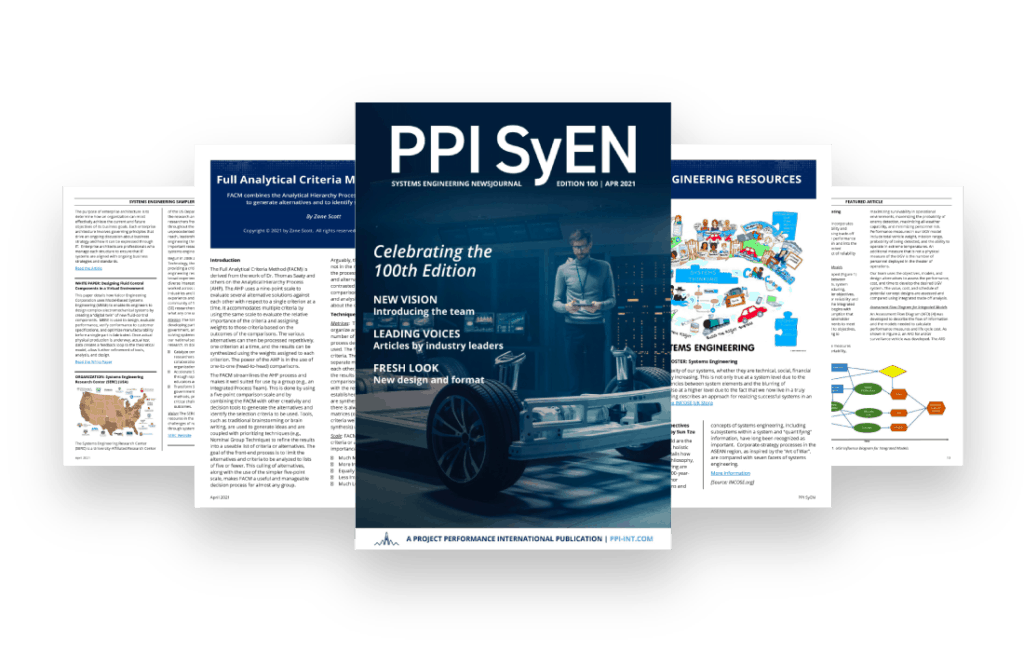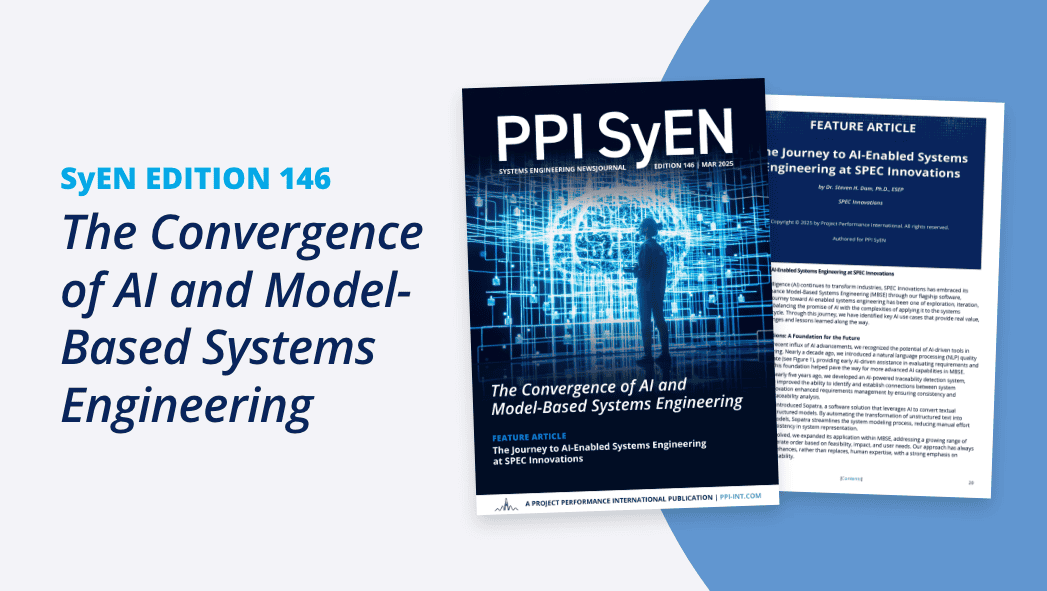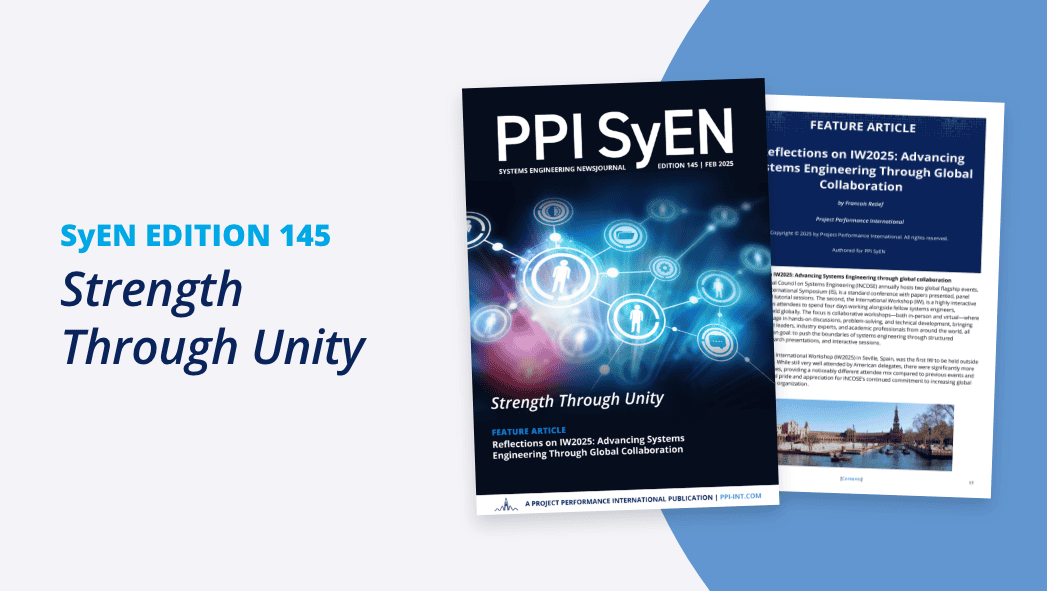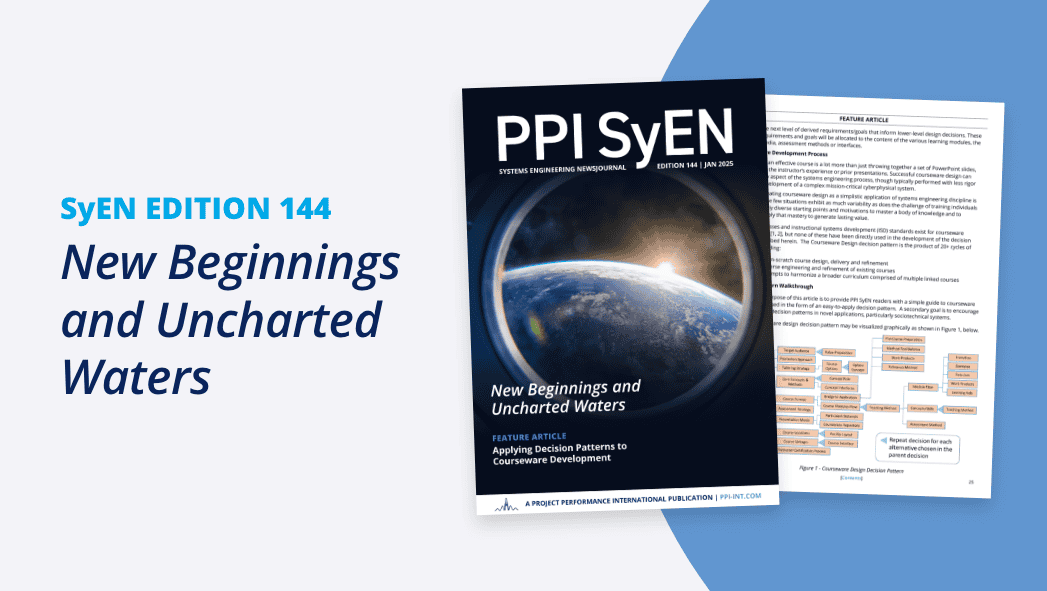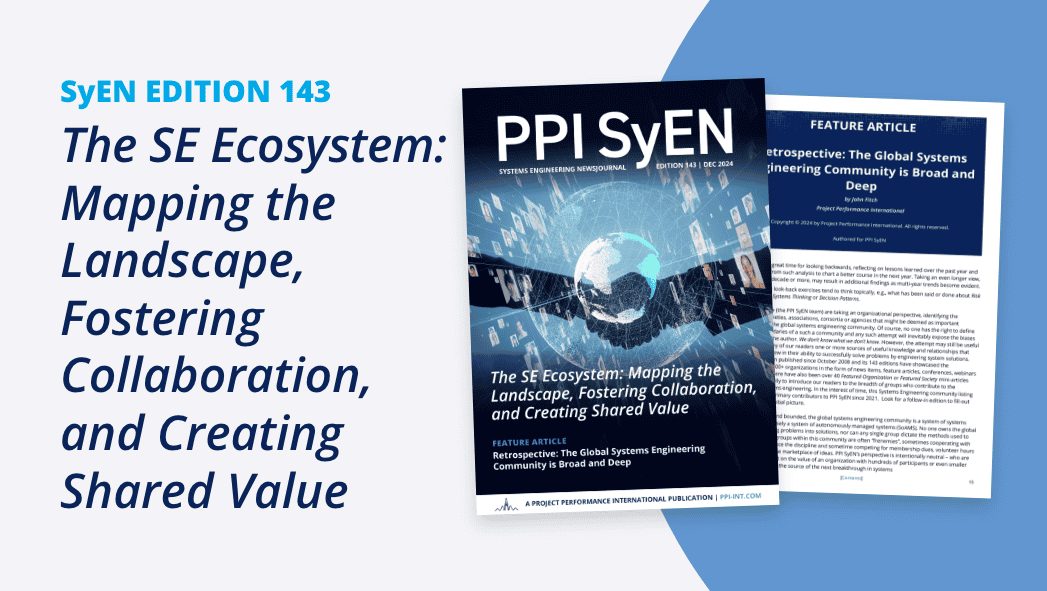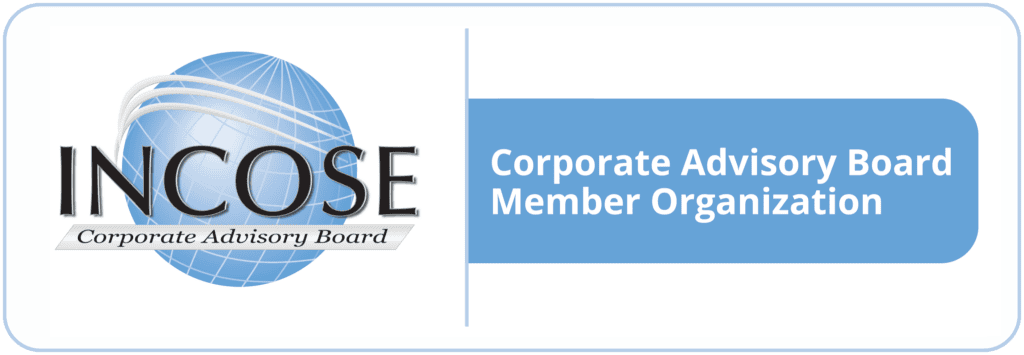WHAT’S INSIDE:
A Quotation to Open On
Feature Article: Modelling as a Tool in the Engineering of Systems of Systems
Systems Engineering News
- Call for Papers: MODELS 2010 Doctoral Symposium
- Systems Thinking 101: The Magic of Systems Thinking
- Survey of Systems Engineering for VSMEs and Small Projects
- Upcoming Submission Deadlines and Themes for INSIGHT
- Please Take Part in the INCOSE UK’s Systems Engineering Survey
Featured Societies – TBD
INCOSE Technical Operations – Systems Engineering Standards Resource Center
Systems Engineering Software Tools News
- PivotPoint Doubles Down on Business Process Modeling with Advanced BPMN 2 + UML 2 Training
- eDev Technologies Launches inteGREAT Enterprise 2010
- New Interoperability Tools for IBM Rational DOORS users
- Atego launches Artisan Studio 7.2
Systems Engineering Books, Reports, Articles and Papers
- Complexity and Management – Fad or Radical Challenge to Systems Thinking?
- Process Improvement and CMMI® for Systems and Software
- Systems Thinking: A Technique to Find Project Problems
Conferences and Meetings
Education and Academia
- Institute for Advanced Systems Engineering
- Research Fellow – University of Surrey – Faculty of Engineering & Physical Sciences, Surrey Space Centre
Some Systems Engineering-Relevant Websites
Standards and Guides
- Tutorial: Architectural Rendering with ISO/IEC 42010
A Definition to Close on
PPI News
PPI Events
A Quotation to Open On
TBD
Feature Article
Modelling as a Tool in the Engineering of Systems of Systems
By Jan Roodt
Introduction

Golden Gate Bridge[1]
Modern engineering is continuing to push the boundaries, just like the civil engineering of the previous centuries did within the context of those days. Building the large span bridges like the Golden Gate Bridge shown above, was not a simple feat. Engineers had to consider new materials, new ways of construction, the geography of the region (on a known planetary fault line and prone to earthquakes), and many other issues. What is interesting is that engineers have been using models since antiquity to first of all sell their concepts, and then to ensure that the final product adhered to the original intent as closely as possible.
In this short article I want to consider the challenges faced by modern system engineers dealing with complexity. A short introduction to the concept of complexity (and why it is relevant to system engineering) will be followed by some ideas around the modelling of systems that exhibit the properties of complex systems.
Complexity surrounds us
There are many definitions and descriptions for the concept of complexity. I like to consider complex systems, mainly because complexity can be thought of as a systemic property [1]. Furthermore, my interest in this article is in those systems with a multitude of interacting, hierarchical elements, some of which may be human, or elements with non-linear behaviour, like fuzzy control systems. The problem with these types of systems is that is almost impossible to determine how all the elements may interact at any given time, or what sort of system level behaviour may emerge. Given a certain behaviour, it follows that it is also difficult to understand how each of the components contribute to the observed, emergent operation.
Complex systems are sensitive to small perturbations: this immediately raises concerns around repeatability, and what worked last time may turn out not to be a solution this time. If the system adapts over time, as all complex systems do, it implies that a strategy that worked today may not work tomorrow. Casti [2] gives us a few pointers to try and identify complex systems. Complex systems:
- Have a moderate number of “agents” or elements,
- Are intelligent (capable of non-linear response) and adaptive,
- Rely on “Small World” interaction.
Agents are entities with input-output behaviour, acting on information and adaptive, taking history into consideration, so they can compare past with present. It has access to a basic learning algorithm. The number of agents is more than a few, but less than a multitude. This means that there is enough interaction to ensure richness, but not so much that we can approximate the behaviour by statistics. Small world interactions dictate that a network is established between “nearest” neighbours and no single agent has access to all the signals in the environment, but relies on the network for access to information. To design and instantiate any system to work in such an environment or to be a part of such a system, one must understand if it itself will be a complex system and how to bound the design space.
By definition a system has a boundary and complex systems have “ports” or porous boundaries through which they interact with the environment (which one could see as a system too). The complex system derives information from the environment, acts on it and reacts on feedback. This supplies the complex system with context and obviously makes demarcation of the appropriate boundary to the space to be considered during design. Philosophically speaking, if one considers the Universe a system, the big question is where the boundaries are, and how the system is “open”. If it is not open, one can claim that it is not complex! In any socio-technical system (a collection of human or “aware” agents and machine elements that interact in an integrated way), the system behaviour arises from multiple interactions amongst the constituent parts, and in as a result of its contextual connectedness to the environment in which it is embedded [3].
As I am interested in developing some ideas around the engineering of systems-of-systems, my argument is that “boundary” establishment and management must be seen as a crucial part of the initial work. Without understanding how the system interacts with its environment, and where the environment “begins and ends”, the task of defining the system context in any sense – ontologically or phenomenologically, is almost impossible.
In short then, most of our modern systems are of a socio-technical nature and are complex. New service-oriented systems must be devised daily, for example and it is expected that the system engineer will ensure that the delivered solutions match the (rapidly changing) market requirements, that it can be adapted over time and sustained and serviced as needed over its full life cycle, and that it is (and remains) interoperable with other systems [4] amongst other things. How do we go about successfully defining and developing new systems in such an environment?
Modelling to Understand
In a recent book on the topic of the design of complex systems, Aslaksen [5] makes an urgent case for top-down design approaches to ensure that systems achieve their required operational goals. I have adapted his diagram slightly to highlight the process.
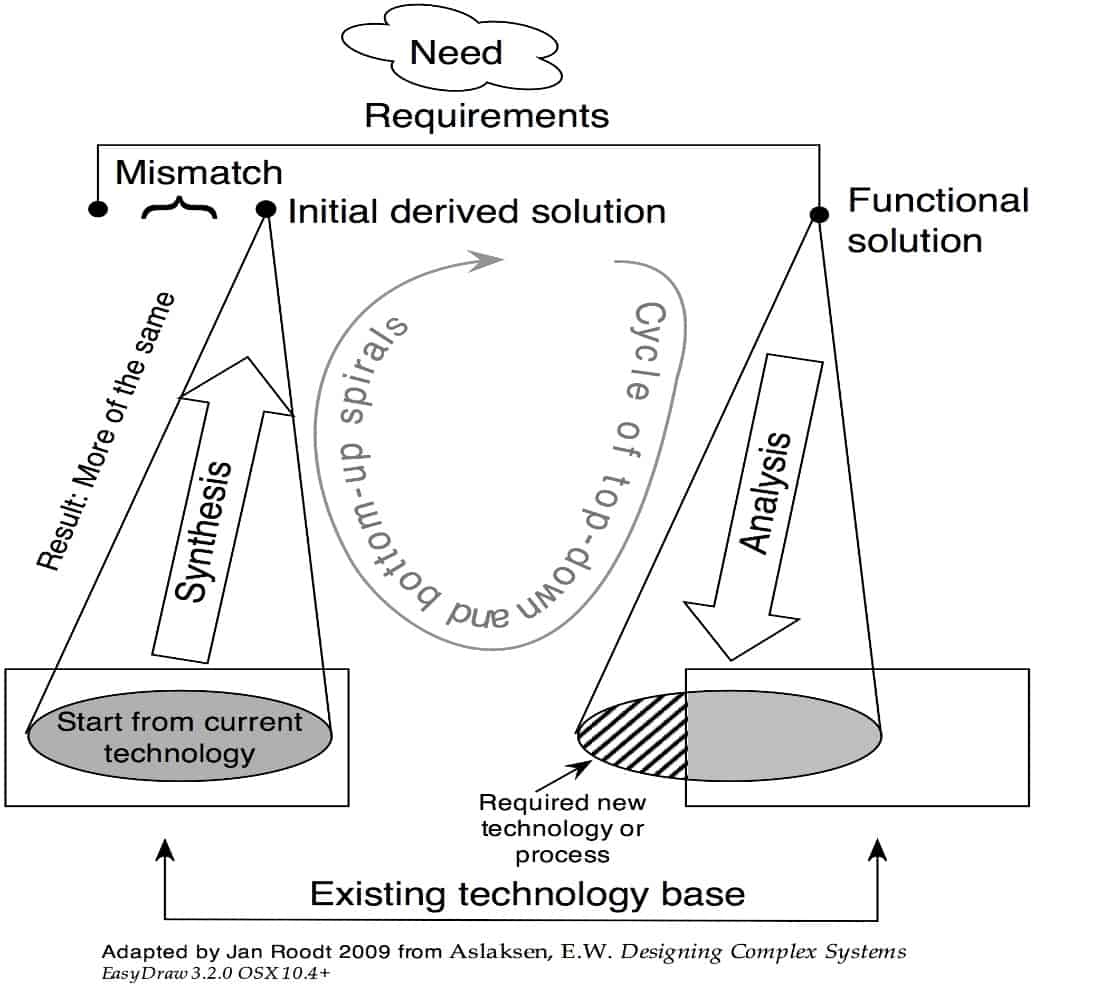
We are all aware of the fact that almost all the large projects we encounter these days require new technology innovations. What Aslaksen is saying is that if we start from our established base and we design solutions with that context only, we will get more of the same and possibly a large mismatch with the required capability of the system. His counter proposal is to start with the conceptual functional solution. I am saying that a process in a tight cycle with bottom-up methods should be followed and the way to achieve this is to use modelling extensively to synthesise existing and conceptual technologies and processes into a continuous evolutionary solution space. This does not mean that we have a shifting baseline in the worst sense, but rather that the technology trends can be utilized more effectively to track the changing requirements space as part of a through-life approach to the solution.
According to Cilliers [6], modelling allows us to build an understanding of things. At the same time he is careful to state that complex systems may be problematic in this sense and one of the reasons mentioned [7] is the notion of incompressibility. The idea is that there is no accurate model of the system that is simpler than the system itself: we need to use the system as the model! This is perfectly reasonable from a philosophical perspective, but has limited value in engineering. As a physicist I believe that Cilliers is correct and as an engineer I hold that we must find ways to work around his constraint. Indeed, Cilliers specifically does not argue against modelling, but only argues that no perfect model can be found for a complex system.
Going back to an earlier statement that the system boundary management is a key element of system engineering, it may be possible to use modelling techniques and tools that start from context setting to derive reasonable and appropriate system solutions. The context will dictate the level of detail needed in the functional and ontological sense. Building software models in a cyclic manner, that is, modelling more detail in a functional sense only up to the point that the system elements seem to deliver a coherent solution to the need, may hold the key. The following diagram shows what modelling methods are appropriate to describe what type of phenomena.
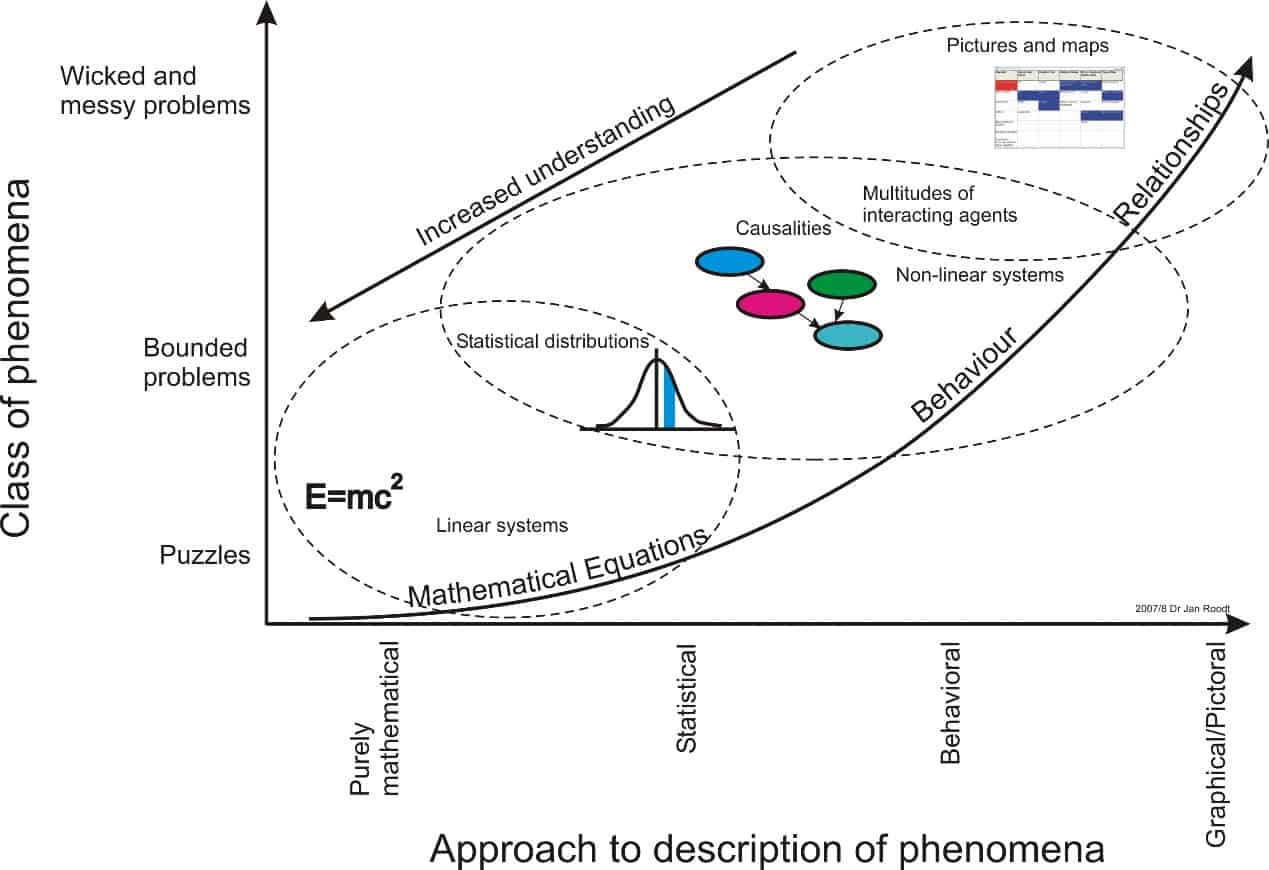
Some models in physics approach the laws of nature, like the conservation of energy. It is possible to write down equations for these relationships that accurately describe the phenomenon to the best of our current knowledge. I refer to these on the Y-axis as puzzles. At the other end of the scale are the messy realities where we know that it is difficult to derive an optimal solution. We have no way of knowing that we have indeed discovered an optimal solution, or if one in fact exists. Here the only way to describe the problem would be to have a model that frames the context and relationships, a qualitative model rather than a quantitative one.
The interesting thing is that once such a descriptive and coherent model exists, it becomes possible to derive functional and causal models at the level of system behaviour, which in turn allows us to understand how the system elements may be interacting. This does not mean that we have a full understanding of the non-linearities in the system. It only means that we can isolate contextual blocks that can yield to known design approaches, like SysML [8]. Constantly jumping into the detail and then standing back to evaluate the result allows us to develop a system level model and understanding that may be used to design the first functional description of the complex system we need to develop.
The Case of Command and Control Modelling
Command and Control (C&C) in military systems is not a simple thing to model as it relies heavily on the people making decisions and advanced supporting technologies, like networks, radios, etc. It is a classic social-technical system.
A current project allows us to experiment with the methods described above in this domain of military affairs. The goal is to develop an adaptive doctrine and resulting C&C for use in modern warfare. It was found that setting a context and describing the boundary of the system to be developed highlighted several issues. It was discovered that the C&C remains complex, no matter what functional level or hierarchical level of military organization was designated. C&C remains complex in the sense described by Casti and listed earlier, whether it is studied at the level of an air defence battery, or at the level of a battalion. The people and their actions and decision processes are core elements that drive the system behaviour.
However, it is recognized that in terms of relationships and patterns, one can make a case for a process description that could scale, given that the human agents are modelled to interact in a non-linear way with the process, in response to a well defined set of environmental stimuli. Mixing event based (process modelling) and agent based modelling seems to yield a system model that has emergent behaviour that is coherent and similar to that of the real systems.
A top-down and bottoms up cycle is used to link functionality required with known technological constraints or parameters. By “stretching” the ability of the technologies or the doctrine or both, better fit with the stated needs can be demonstrated. From the perspective of the discipline of Systems Engineering, this is a promising result, because once the functional description of the system emerges, classic processes can be used to develop the requirements and to turn out feasible solutions. Once this is done, it is possible to procure systems off the shelf or to develop custom modifications to fit with a local requirement.
Conclusion
Although it is not possible to develop absolute models of complex systems, it is still possible to develop a range of models that will allow the systems engineer to gain the upper hand in the design and delivery of real working systems. The new understanding about the nature of socio-technical systems can be used in this endeavour. I argued that proper contextualization and boundary setting is a critical pre-condition for success. Too often the pressure is there to start from the current technology base and building blocks, with the result that more of the same, and mostly off-the-mark solutions are delivered. The expectations that more smart systems will be developed to support humankind, will grow. With it the tools and approaches have to develop rapidly to take the new reality into account.
Reference List
- Juarrero, A. (2010), Complex Dynamical Systems Theory, retrieved from http://cognitive-edge.com/articledetails.php?articleid=62 on 8 June 2010.
- Casti, J L. (1997), Would-be Worlds – How simulation is changing the frontiers of science, New York: John Wiley & Sons.
- Mathieson, G.L. (2009), Knots, Lace and Tartan: Making Sense of Complex Human Systems in Military Operations Research – The Selected Works of Graham L. Mathieson, edited by K.A. Richardson, ISCE Publishing.
- Oliver, D.W., Kelliber, T.P. & Keegan, J.G. (1997), Engineering Complex Systems with Models and Objects, New York: McGraw-Hill.
- Aslaksen, E.W. (2009), Designing Complex Systems: Foundations of design in the functional domain, New York: CRC Press – Taylor and Francis Group.
- Cilliers, P. (1998), Complexity and postmodernism – Understanding complex systems, New York: Routledge.
- Cilliers, P. (2000), Knowledge, Complexity and Understanding, Emergence Vol 2 (4): Lawrence Erlbaum Associates.
- Weilkiens, T. (2007), System Engineering with SysML/UML – Modeling, Analysis, Design, Amsterdam: Elsevier – Morgen Kaufmann.
About Jan Roodt
Jan Roodt is a member of INCOSE and a registered practicing scientist at the Council for Scientific and Industrial Research (CSIR) in South Africa. In his capacity as Contracts R&D Manager he has established several new areas of technology research and application for the RSA DoD, including a capability for applied research in Command and Control and an application area focused on modelling and simulation for acquisition decision support (MSADS). Jan holds a PhD in Engineering Science from the University of Stellenbosch and will relocate to Dunedin in New Zealand during July 2010, where he plans to start a small consultancy.
Systems Engineering News
Call for Papers: MODELS 2010 Doctoral Symposium
The goal of the Doctoral symposium is to provide a forum in which PhD students can present their work in progress and to foster the role of MODELS as a premier venue for research in model-driven engineering. The symposium aims to support students by providing independent and constructive feedback about their already completed and, more importantly, planned research work.
The technical scope of the symposium covers all topics of MODELS 2010.
Systems Thinking 101: The Magic of Systems Thinking
If you’ve ever wondered “What is systems thinking?” or wanted to know more about systems thinking in general, check out this handy 7-day series.

 Survey of Systems Engineering for VSMEs and Small Projects
Survey of Systems Engineering for VSMEs and Small Projects
The Systems Engineering for Very Small and Micro Enterprises (SE for VSMEs) Working Group (WG), a WG mandated by INCOSE (International Council on Systems Engineering) and AFIS (Association Française d’Ingénierie Système), is conducting a survey to:
- Identify strengths and weaknesses of product development practices in VSMEs and small projects in Various Domains
- Characterize the state of practice of product development in this context
- Identify areas where the practice of systems engineering can better assist product development in this context
The survey can be taken at http://isosurvey.logti.etsmtl.ca/vsme_survey_eng.htm
Upcoming Submission Deadlines and Themes for INSIGHT
INSIGHT is the newsletter of International Council on Systems Engineering. It is published four times per year (January, April, July, October). INSIGHT features status and information about INCOSE’s technical work, local chapters, and committees and boards. Additionally, related events, editorials, book reviews, trends, and how-to-do articles that are pertinent to the many aspects of a systems engineer’s job are also included, as space permits.
Upcoming submission deadlines and themes for INSIGHT
|
Issue |
Submission Date for General Articles |
Theme |
Theme Editor |
Deadline for Theme Article Proposal* |
|
3rd Qtr 2010 |
8 Aug 2010** |
2010 International Symposium Coverage: Chicago, Illinois, USA |
11 Nov 2009 |
|
|
4th Qtr 2010 |
15 Oct 2010 |
Systems Development from Deep Sea to Deep Space: Lessons from the Johns Hopkins Applied Physics Lab |
||
|
1st Qtr 2011 |
15 Feb 2011 |
Knowledge Management for Systems Engineering |
21 May 2010 |
Please Take Part in the INCOSE UK’s Systems Engineering Survey
INCOSE UK is now looking to broaden its knowledge of the UK’s Systems Engineering (SE) community by understanding the work Systems Engineers do in a little more detail. For example: are they being offered the right challenges and opportunities? Are they using their SE skills as they would like? What do they find most rewarding from their career as a Systems Engineers? The answers to these and similar questions will guide INCOSE UK in how it continues to support Systems Engineering across the UK
Featured Society – TBD
TBD
INCOSE Technical Operations
Systems Engineering Standards Resource Center
The International Council on Systems Engineering Standards Technical Committee (STC) is one of the most active communities within INCOSE. Its members are working to advance and harmonize systems engineering standards used worldwide.
Current SE Standards
ANSI/GEIA EIA-632, Processes for Engineering a System, 01 Sept 2003
Available for purchase from the Government Electronics and Information Technology Association (GEIA)
Under revision by GEIA G-47 to align with ISO/IEC 15288; early stage of development (next meeting January 2005).
EIA/IS 731.1, Systems Engineering Capability Model, Electronic Industries Alliance (Interim Standard), 01 Aug 2002
Available for purchase from the Government Electronics and Information Technology Association (GEIA)
IEEE 1220-1998, IEEE Standard for Application and Management of the Systems Engineering Process, Institute of Electrical and Electronics Engineers, 01 May 1998
Available for purchase from the Government Electronics and Information Technology Association (GEIA)
Revision to align IEEE 1220 with ISO/IEC 15288 and provide a lower level of detail than 15288 is underway and due out December 2004. After that it will be fast tracked as an ISO standard.
ECSS-E-10 Space Engineering
Systems Engineering Part 1B: Requirements and process, 18 Nov 2004
Systems Engineering Part 6A: Functional and technical specifications, 09 Jan 2004
Systems Engineering Part 7A: Product data exchange, 25 August 2004
Available for download from European Cooperation for Space Standardization
ISO/IEC 15288: 2002 – System Life Cycle Processes
Available for purchase from the International Organization for Standardization (ISO)
JTC1/SC7/WG7
Harmonization of ISO/IEC 15288 and ISO/IEC 12207:1995 & 2 Addendum 2002, 2004 (software life cycle processes) is under development. This is nearing WD.1 (working draft 1) stage.
ISO/IEC 19760:2003 – A Guide for the Application of ISO/IEC 15288
Available for purchase from the International Organization for Standardization (ISO)
ISO/IEC 15504: 2004 – Information Technology – Process Assessment
JTC1/SC7/WG10
Available for purchase from the International Organization for Standardization (ISO)
Part 1: Concepts and vocabulary (2004)
Part 2: Performing an assessment (2003)
Part 3: Guidance on performing an assessment (2004)
Part 4: Guidance on use for process improvement and process capability determination (2004)
Part 5: An assessment model and indicator guidance (1999)
ISO 10303-AP233, Industrial automation systems and integration — Part 233: Systems engineering data representation
Additional information available on the AP-233 website
Currently in working draft form
Other Standards
ANSI/AIAA G-043-1992, Guide for the Preparation of Operational Concept Documents
Being upgraded now by INCOSE and AIAA partnership
IEEE 1471, 2000: IEEE Recommended Practice for Architectural Description of Software-Intensive Systems
Available for purchase from IEEE
Capability Maturity Model Integration (CMMI)
All you need to know is available from the Carnegie Mellon Software Engineering Institute’s CMMI website
Merger of SW-CMM (from SEI) and SECM (EIA/IS 731)
Released in July 2000 (Combined SE/SW model)
Later release with IPD elements (version 1.01), Nov 2000
Might be developed into full standard by EIA
Unified Modeling Language (UML)
Available for download from the Object Modeling Group (OMG)
To be issued as ISO standard
Version 1.5 is released; version 2.0 is in finalization
Systems Modeling Language (SysML)
Latest draft is available for download from the SysML Partners website
The INCOSE Modeling & Tools Technical Committee is working with the OMG and SysML Partners to create an extension to UML version 2.0 to support systems engineering
Systems Engineering Software Tools News
PivotPoint Doubles Down on Business Process Modeling with Advanced BPMN 2 + UML 2 Training
PivotPoint Technology Corporation announced that it is expanding its business process modeling training and is supporting the synergistic usage of two leading modeling language standards—BPMN and UML. PivotPoint’s new advanced business process modeling workshops will extend its popular Essential BPMN Applied™ workshops for business analysts and software developers.
eDev Technologies Launches inteGREAT Enterprise 2010
eDev launched inteGREAT Enterprise 2010 for automated requirements definition on April 6th 2010 at Microsoft Canada Head Quarters.
inteGREAT, a Microsoft BlueSky award winning product, is a requirements definition, simulation, validation, collaboration and test document automation technology that provides bidirectional integration with Team Foundation Server 2010.
 Part of the offering is this inteGREAT Acquisition Business Case and Return on Investment.
Part of the offering is this inteGREAT Acquisition Business Case and Return on Investment.
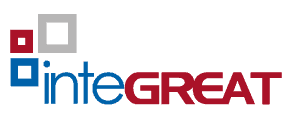
New Interoperability Tools for IBM Rational DOORS users
SODIUS has just released MDConnect™ for DOORS solutions that help the DOORS® user community navigate through their requirement data in Eclipse and interoperate with other applications.
IBM Rational DOORS is often used in conjunction with other lifecycle tools of various types and from multiple vendors, creating increasing challenges to design and maintain traceability throughout these projects. All the necessary interactions between those applications make integration and interoperability questions more and more critical.
This new offering enforces SODIUS’s commitment to bring innovative solutions to address interoperability challenges and allow lifecycle tools to work together
Atego launches Artisan Studio 7.2
Atego has launched Artisan Studio 7.2, a major new version of its flagship model-driven development tool suite.
Artisan Studio 7.2 delivers a variety of significant new modeling capabilities and functions. Artisan Studio has been re-architected to provide role-based Editions which have been specifically designed to make the working environment more relevant and efficient for the specialist needs of Enterprise Architects, Systems Engineers and Software Engineers. Artisan Studio also adds DoDAF capabilities to complete its support for the OMG’s UPDM 1.0 standard for defense architectural frameworks. Artisan Studio 7.2 also extends Artisan Studio Reviewer with metric reporting and simplifies the user interface to Artisan Publisher as well as continuing to improve core technologies with a new model comparison tool, the Artisan Model Differencer, and adds more functionality for the Automatic Code Synchronizer and Activity Modeling.
Systems Engineering Books, Reports, Articles and Papers
Fad or Radical Challenge to Systems Thinking?
Author: Ralph D. Stacey
Publisher: Routledge, UK, 2000
ISBN: 978-0-415-24761-0 (paperback)
978-0-415-24760-3 (hardback)
978-0-203-18468-4 (electronic)
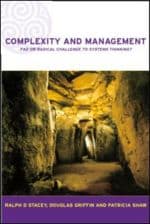 Summary:
Summary:
Complexity theory is generating increasing interest amongst strategic thinkers. This fascinating book covers issues such as predictability, creativity and relationships as it considers how complexity, and its central principles of emergence and self-organization, are being used to understand organizations. The book:
- introduces the variety of views put forward by different writers on complexity and management
- outlines and critiques the way that complexity theory is frequently interpreted purely in the context of systems thinking
- draws a new perspective on using complexity sciences to understand organizational stability and change by focusing on the emergence of novelty and creativity in the course of everyday processes
- calls for a radical re-examination of management thinking.
Timely and controversial, Complexity and Management is essential reading for anyone interested in strategy, systems thinking, organization and management theory, and organizational change.
Process Improvement and CMMI® for Systems and Software
Ron S. Kenett, KPA, Ltd., Raanana, Israel;
Emanuel Baker, Process Strategies, Inc., Los Angeles, California, USA
Publisher: CRC Press, March 09 2010
ISBN: 9781420060508
ISBN 10: 1420060503
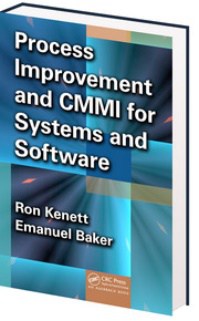 Summary:
Summary:
Presenting the state of the art in strategic planning and process improvement, Process Improvement and CMMI® for Systems and Software provides a workable approach for achieving cost-effective process improvements for systems and software. Focusing on planning, implementation, and management in system and software processes, it supplies a brief overview of basic strategic planning models and covers fundamental concepts and approaches for system and software measurement, testing, and improvements.
The book represents the significant cumulative experience of the authors who were among the first to introduce quality management to the software development processes. It introduces CMMI® and various other software and systems process models. It also provides readers with an easy-to-follow methodology for evaluating the status of development and maintenance processes and for determining the return on investment for process improvements.
The authors examine beta testing and various testing and usability programs. They highlight examples of useful metrics for monitoring process improvement projects and explain how to establish baselines against which to measure achieved improvements. Divided into four parts, this practical resource covers:
- Strategy and basics of quality and process improvement
- Assessment and measurement in systems and software
- Improvements and testing of systems and software
- Managing and reporting data
The text concludes with a realistic case study that illustrates how the process improvement effort is structured and brings together the methods, tools, and techniques discussed. Spelling out how to lay out a reasoned plan for process improvement, this book supplies readers with concrete action plans for setting up process improvement initiatives that are effective, efficient, and sustainable.
Systems Thinking: A Technique to Find Project Problems
Posted on 16. Jun, 2009 in NETWORK by Bas de Baar
Finding the real cause of a project problem can be a difficult task. You have to look for patterns …
“These patterns are dynamic systems in action, a human system seen over a time period. Patterns are trends over time and involve dependencies with other systems. To spot such trends in projects we use metrics as indicators. If I have the right metrics I can ignore everything around me and focus just on the dashboard.”
A technique that can be used to find patterns and the real cause-effect-chains in projects is systems thinking. “Systems Thinking” is one of the 5 disciplines described in the famous book “The Fifth Discipline” by Peter Senge (for an overview view my posting “Fifth Discipline: What To Do When All Your Projects Are Failing“).
This is the first post in a series that will describe this technique and how to use it in your projects.
Conferences and Meetings
The Second Workshop on Behavioural Modelling – Foundations and Application
![]() (BM-FA 2010)
(BM-FA 2010)
15 June 2010, University of Pierre & Marie Curie, Paris, France
http://www.ou.nl/eCache/DEF/2/17/059.html
3rd Workshop on Model-based Testing in Practice
Held in conjunction with ECMFA 2010
June 15/16 2010, University Pierre & Marie Curie, Paris, France
http://www.fokus.fraunhofer.de/en/fokus_events/motion/motip_2010/index.html
The Fifth Workshop “From code centric to model centric: Evaluating the effectiveness of MDD (C2M:EEMDD)”
Held in conjunction with ECMFA 2010
June 15th-18th, 2010, University Pierre & Marie Curie, Paris, France
http://www.esi.es/modelplex/c2m/
2nd International Workshop on Model-driven Product Line Engineering
Held in conjunction with ECMFA 2010
June 15th-18th, 2010, University Pierre & Marie Curie, Paris, France
6th European Conference on Modelling Foundations and Applications
(ECMFA 2010)
June 15-18, 2010, University Pierre & Marie Curie, Paris, France
3rd Workshop on Model-Driven Tool & Process Integration
Held in conjunction with ECMFA 2010
June 16, 2010, University Pierre & Marie Curie, Paris, France
http://www.fokus.fraunhofer.de/en/fokus_events/motion/mdtpi_2010/index.html
An Introduction to Requirements
June 16, 2010, Cranfield University, Cranfield, Bedfordshire, UK
http://www.resg.org.uk/index.php/An_Introduction_to_Requirements_20101
17th Annual American Society for Engineering Education Conference
June 20 – 23, 2010, Louisville, Kentucky, USA
http://www.asee.org/conferences/annual/2010/
2nd International Workshop on Abstractions for Petri Nets and Other Models of Concurrency
a satellite event of Petri Nets 2010
June 21, 2010, Braga, Portugal
http://www.win.tue.nl/apnoc2010/
International Workshop on Formalization of Modeling Languages
Colocated with ECOOP 2010
June 21 or 22, 2010 – Maribor, Slovenia
http://www.cis.uab.edu/FML2010
PETRI NETS 2010
June 21-25, 2010, Braga, Portugal
http://acsd-petrinets2010.di.uminho.pt/?page=Main
ACSD 2010: 10th International Conference on Application of Concurrency to System Design
Collocated with Petri Nets 2010
June 21-25, 2010, Braga, Portugal
http://acsd-petrinets2010.di.uminho.pt/?page=ACSD2010
IEEE International Conference on Systems of Systems Engineering
June 22 to 24, 2010, Henry Ford College, Loughborough University, UK
http://www.lboro.ac.uk/service/publicity/whatson/event2282.html
![]() Swiss Requirements Day 2010
Swiss Requirements Day 2010
June 23, 2010, Kongresshaus, Zurich, Switzerland
http://www.swissrequirementsday.ch/
ISARCS 2010 – 1st International Symposium on Architecting Critical Systems
Federated with CompArch 2010
June 23-25 2010 Prague, Czech Republic
http://www.isarcs.org/isarcs2010/
Conference on Systems Thinking & System Dynamics in the classroom
June 26-28, 2010, Babson Conference Center, Wellesley, Massachusetts, USA
http://www.e3washington.org/events/item.html?id=89
1st International Workshop on Collaborative Modeling & Simulation – CoMetS’10
June 28 – 30, 2010, TEI of Larissa (Greece)
http://www.sel.uniroma2.it/CoMetS10/
ICMT2010 – Intl. Conference on Model Transformation
Co-located with TOOLS Europe 2010, ICSMP 2010, SEAFOOD 2010, TAP 2010
June 28-July 2 2010 – Malaga, Spain
http://www.model-transformation.org/ICMT2010/
1st Workshop “RE in Small Companies (RESC)”
Held in conjunction with REFSQ 2010, Essen, Germany
June 29, 2010, Essen, Germany
CREARE – 1st Workshop on Creativity in Requirements Engineering
Held in conjunction with REFSQ 2010, Essen, Germany
29th June 2010, in Essen, Germany
http://sites.google.com/site/creare2010/
First International Workshop on Product Line Requirements Engineering and Quality (PLREQ’10)
Held in conjunction with REFSQ 2010, Essen, Germany
June 30, 2010, Essen, Germany
http://sites.google.com/site/plreq10/home
2nd International Workshop on Model Transformation with ATL
In conjunction with Tools 2010 Federated Conferences.
June 30, 2010 – Malaga, Spain
http://www.emn.fr/z-info/atlanmod/index.php/MtATL2010
16th International Working Conference on Requirements Engineering: Foundation for Software Quality (RefsQ 2010)
June 30 July 2, 2010, Essen, Germany
http://www.sse.uni-due.de/refsq/2010/
IV Brazilian e-Science Workshop
(in conjunction with CSBC 2010)
July 2010, Belo Horizonte, MG, Brazil
http://www.dcc.ufrj.br/~escience/
Transformation Tool Contest 2010
Satellite workshop to TOOLS 2010
July 1-2, 2010, Malaga, Spain
http://is.ieis.tue.nl/staff/pvgorp/events/TTC2010/
2010 International Conference on System Science and Engineering (ICSSE2010)
July 1-3, 2010, National Taipei University of Technology, Taipei, Taiwan
http://isd.ie.ntnu.edu.tw/ICSSE2010/
10th International Conference on Web Engineering
July 5 – 9, 2010 in Vienna, Austria
http://icwe2010.webengineering.org/
![]() Resilient & Secure Architectures – Afternoon Seminar
Resilient & Secure Architectures – Afternoon Seminar
July 6, 2010, Auditorium, Engineers Australia National Office, Barton Australia
Resiliant architecture flyer.pdf
![]() Dutch Model Checking Day
Dutch Model Checking Day
July 9, 2010, Eindhoven University of Technology
http://www.win.tue.nl/dmcd2010/
Sixth Workshop on Model Checking and Artificial Intelligence (MoChArt 2010)
At AAAI-2010, Twenty-Fourth AAAI Conference on Artificial Intelligence
![]() July 11, 2010, Atlanta, Georgia, USA
July 11, 2010, Atlanta, Georgia, USA
http://mochart.informatik.uni-freiburg.de/
Summer Computer Simulation Conference (SCSC 2010)
July 11–14, 2010, Ottawa, Canada
http://www.dacya.ucm.es/jlrisco/SCSC10/doku.php
20th Annual INCOSE International Symposium
July 11 – 15, 2010, Hyatt Regency O’Hare, Rosemont, IL, USA
http://www.incose.org/newsevents/events/details.aspx?id=77
Eighth International Workshop on Dynamic Analysis (WODA 2010)
Co-located with ISSTA 2010
July 12th or July13th 2010, Trento, Italy
4th ACM International Conference on Distributed Event-Based Systems (DEBS 2010)
July 12-15, 2010, Cambridge, United Kingdom
4th IEEE International Workshop on Requirements Engineering For Services (REFS’10)
In conjunction with COMPSAC 2010
July 19 – 23, 2010, Seoul, Korea
http://compsac.cs.iastate.edu/workshop_details.php?id=22
1st International Workshop on Complexity and Real World Applications Using the Tools and Concepts from the Complexity Sciences to Support Real World Decision-making Activities
July 21-23, 2010, Southampton, England
http://iscepublishing.com/Forum/default.aspx?g=posts&m=227
System Dynamics Society 2010 Conference
July 25 – 29, 2010, Seoul, Korea
http://www.systemdynamics.org/conferences/current/index.htm
ECAI 2010 Workshop on Intelligent Engineering Techniques for Knowledge Bases
Aug 16, 2010, Lisbon, Portugal
http://ase.ist.tugraz.at/ecai_2010/
2nd International Workshop on Open Design Spaces (ODS 2010) – Socially Crafting Interactive Experiences
in conjunction with DIS 2010
August 17 2010, Aarhus, Denmark
http://www.open-design-spaces.de/
7th Annual INCOSE SA Chapter Conference
August 17 – 19, 2010, CSIR International Convention Centre, Pretoria, South Africa
The 2nd International Workshop on Enterprise Architecture Challenges and Responses
To be held in conjunction with ICIS 2010
August 18 – 20, 2010, Yamagata University, Yonezawa, Japan
http://sewtl.towson.edu/weacr2010/
The Second International Conference on Advances in System Testing and Validation Lifecycle (VALID 2010)
August 22-27, 2010 – Nice, France
http://www.iaria.org/conferences2010/VALID10.html
Improving Systems and Software Engineering Conference (ISSEC 2010)
23 – 26 August 2010
Brisbane Convention & Exhibition Centre, Brisbane, Australia
Workshop on Multi-Agent Systems and Simulation (MAS&S)
August 30 – Sep 3, 2010, Lyon (France)
http://lisdip.deis.unical.it/workshops/mass10/
2nd International Workshop on Model-Driven User-Centric Design & Engineering (MDUCDE’10)
September 1st & 2nd, 2010, Valenciennes/France
http://www.zmmi.de/MDUCDE2010/
European Systems & Software Process Improvement and Innovation
September 1-3, 2010, Grenoble Institute of Technology, France
INTERACT 2011 – 13th IFIP TC13 Conference on Human-Computer Interaction
September 05-09, 2011, Lisbon, Portugal.
Summer School 2010: Verification Technology, Systems & Applications
![]() September, 06th-10th, 2010, University of Luxembourg, Luxemburg
September, 06th-10th, 2010, University of Luxembourg, Luxemburg
http://www.mpi-inf.mpg.de/VTSA10/
3rd Workshop on Autonomic and SELF-adaptive Systems
September 8, 2010, Valencia, Spain
http://quercusseg.unex.es/waself/
1st International Workshop on Reuse in Business Process Management (rBPM 2010)
September 13, 2010, Hoboken, New Jersey – USA
http://each.uspnet.usp.br/rbpm2010/
Modeling Business Information Systems (MoBIS 2010)
September 15-17, 2010, Dresden, Germany
7th International Conference on Quantitative Evaluation of SysTems (QEST) 2010
September 15 – 18, 2010, Williamsburg, Virginia, USA at the College of William & Mary, Computer Science Department,
First International Workshop on Evolution Support for Model-Based Development and Testing (EMDT2010)
Co-located with the International Scientific Colloquium (IWK2010)
September 16, 2010, Ilmenau, Germany
15th International Workshop on Formal Methods for Industrial Critical Systems
(FMICS 2010)
September 20-21, 2010, Antwerp, Belgium
https://es.fbk.eu/events/fmics2010/index.php
8th International Symposium on Automated Technology for Verification and Analysis (ATVA 2010)
September 21-24, 2010, Singapore
http://atva10.comp.nus.edu.sg/index.html
12th International Workshop on Verification of Infinite-State Systems ![]() (INFINITY 2010)
(INFINITY 2010)
September 21, 2010, Singapore
http://www.it.uu.se/workshop/infinity2010/
EPEW 2010: 7th European Performance Engineering Workshop
University Residential Center of Bertinoro, Italy
September 23-24, 2010
http://www.sti.uniurb.it/events/epew2010/
Challenges of Systems Engineering – International Workshop (RuSEC2010)
September 23-24, 2010, Moscow, Russia
http://www.incose.ru/RuSEC2010
ACM International Conference on Design of Communication (SIGDOC’10)
September 26-29, 2010, São Carlos – São Paulo – Brazil
http://www.lia.dc.ufscar.br/SIGDOC2010/
Fourth IEEE International Conference on Self-Adaptive and Self-Organizing Systems (SASO 2010)
September 27-October 1, 2010, Budapest, Hungary
http://www.inf.u-szeged.hu/saso10/index.php
Workshop on Socio-Economics Inspiring Self-Managed Systems and Concepts (SEISMYC 2010)
Located at SASO 2010
September 27th, 2010, Budapest, Hungary
![]() 1st Brazilian Workshop on Model-Driven Development
1st Brazilian Workshop on Model-Driven Development
September 27, 2010, Salvador, Bahia, Brazil
http://www.les.inf.puc-rio.br/opus/wbdsdm/
54th Annual Meeting of the Human Factors and Ergonomics Society
September 27-October 1, 2010, San Francisco, USA
http://www.hfes.org/web/HFESMeetings/2010annualmeeting.html
The 18th International Requirements Engineering Conference (RE 2010)
September 27, 2010 – Oct 1, 2010, Sydney, Australia
Doctoral Symposium @ RE2010
September 27, 2010, Sydney, Australia
http://attend.it.uts.edu.au/re10/?page_id=293
MaRK’10 Third International Workshop on Managing Requirements Knowledge
In conjunction with the 18th IEEE International Requirements Engineering Conference
![]() September 27, 2010, Sydney, Australia
September 27, 2010, Sydney, Australia
http://www1.cs.tum.edu/static/mark10/
REET’10 Fifth International Workshop on Requirements Engineering Education ![]() and Training
and Training
In conjunction with the 18th IEEE International Requirements Engineering Conference
September 28, 2010, Sydney, Australia
http://users.cscs.wmin.ac.uk/REET10/
RELAW’10 Third International Workshop on Requirements Engineering and Law
In conjunction with the 18th IEEE International Requirements Engineering Conference
![]() September 28, 2010, Sydney, Australia
September 28, 2010, Sydney, Australia
http://www.csc2.ncsu.edu/workshops/relaw/
REV’10 Fifth International Workshop on Requirements Engineering ![]() Visualization
Visualization
In conjunction with the 18th IEEE International Requirements Engineering Conference
September 28, 2010 – Sydney, Australia
http://www.gotel.net/REV10.html
WeRE’10 First International Workshop on the Web and Requirements ![]() Engineering
Engineering
In conjunction with the 18th IEEE International Requirements Engineering Conference
September 28, 2010, Sydney, Australia
http://gplsi.dlsi.ua.es/congresos/were10/
Fourth IEEE International Conference on Self-Adaptive and Self-Organizing Systems (SASO 2010)
September 27-October 1, 2010, Budapest, Hungary
http://www.inf.u-szeged.hu/saso10/
Model-based Testing and Test Automation – From Research into Practice (MoTes2010)
September 27 – October 2, Leipzig, Germany
http://adt.uni-paderborn.de/aktuelles/news-unterseiten/motes10cfp.html
Fifth International Conference on Graph Transformation
University Of Twente, Enschede, The Netherlands
September 27 – October 2, 2010
http://www.utwente.nl/icgt2010/
1st Workshop on The Web and Requirements Engineering (WeRE’10)
To be held in conjunction with the RE 2010 Joint Conference
September 28, 2010, Sydney, Australia
http://gplsi.dlsi.ua.es/congresos/were10/
4th International Workshop on Graph Based Tools
A satellite event of ICGT’10
September 28th 2010, University of Twente, Enschede, The Netherlands
http://grabats2010.inf.mit.bme.hu/
PDMC 2010
9th International Workshop on Parallel and Distributed Methods in verifiCation
Joint with 2nd International Workshop on High Performance Computational Systems Biology (HiBi 2010)
September 30 – October 1, 2010, Twente, The Netherlands
Co-locating with
5th International Conference on Graph Transformation (ICGT 2010) , 29 September – 1 October, 2010
17th Annual workshop on Software Model Checking (SPIN 2010), 27 September – 29 September, 2010
ACM/IEEE 13th International Conference on Model Driven Engineering Languages and Systems (MODELS 2010)
October 3-8, 2010, Oslo, Norway
![]() 5th International Workshop models@run.time
5th International Workshop models@run.time
In Conjunction with Models 2010
October 3-8, 2010, Oslo, Norway
http://www.comp.lancs.ac.uk/~bencomo/MRT10/
![]() Workshop on OCL and Textual Modelling
Workshop on OCL and Textual Modelling
In Conjunction with Models 2010
October 3-8, 2010, Oslo, Norway
http://modeling-languages.com/events/OCLWorkshop2010/index.html
![]() First Workshop on Model Driven Interoperability (MDI’2010)
First Workshop on Model Driven Interoperability (MDI’2010)
In Conjunction with Models 2010
October 3-5, 2010, Oslo, Norway
3rd International Workshop on Model Based Architecting and Construction of ![]() Embedded Systems
Embedded Systems
In Conjunction with Models 2010
October 3-5, 2010, Oslo, Norway
http://www.artist-embedded.org/artist/Overview,2130
Fourth Asia-Pacific Conference on Systems Engineering (APCOSE 2010)
October 4-6, 2010, Keelung, Taiwan
http://www.incose-taiwanchapter.org/APCOSE2010/
2010 isee User Conference
October 4-6, 2010, The Westin Providence, Providence, Rhode Island, USA
http://www.iseesystems.com/community/UserConference/Announcement.aspx
IFM 2010: Integrated Formal Methods 8th International Conference
October 11 – 14, 2010, Nancy, France
Sixth Nordic Conference on Human-Computer Interaction (NordiCHI 2010)
October 16 – 20, Reykjavik Iceland
http://www.yourhost.is/nordichi2010
International Institute of Business Analysis (IIBA) Conference
![]() October 17-21, 2010, Alexandria, VA, USA
October 17-21, 2010, Alexandria, VA, USA
http://iiba.informz.ca/IIBA/archives/archive_54465.html
Dynamic Languages Symposium 2010
Co-located with SPLASH 2010
In cooperation with ACM SIGPLAN (PENDING)
October 18, 2010, Reno, Nevada, USA
http://www.dynamic-languages-symposium.org/dls-10/
FMCAD 2010 – Formal Methods in Computer Aided Design
October 20 – 23, 2010, Lugano, Switzerland
http://fmcad10.iaik.tugraz.at/
![]() MIT Systems Thinking Conference
MIT Systems Thinking Conference
October 21-22,2010 , Broad Auditorium, 7 Cambridge Center, Cambridge, Massachusetts, USA
http://sdm.mit.edu/index.php?fileName=conf09/sdm_conference.html
NDIA 13th Annual Systems Engineering Conference
October 25-28, 2010, Hyatt Regency Mission Bay, San Diego, CA, USA
http://www.ndia.org/meetings/1870/Pages/default.aspx
Requirements Days 2010
October 26 – 28, 2010, Mϋnchen, Germany
5th International Workshop on Enterprise Integration, Interoperability and Networking (EI2N’2010)
October 27-28, 2010, Hersonissou, Crete, Greece
http://www.onthemove-conferences.org/index.php/ei2n2010
Complex Systems Design & Management 2010
October 27-29, 2010, Paris, France
http://www.incose-taiwanchapter.org/APCOSE2010/
![]() 12th IEEE International High Assurance Systems Engineering Symposium (HASE 2010)
12th IEEE International High Assurance Systems Engineering Symposium (HASE 2010)
Co-Located with the 21st IEEE International Symposium on Software Reliability Engineering (ISSRE)
November 1-4, 2010, San Jose, CA, USA
29th International Conference on Conceptual Modeling (ER 2010)
November 1-4, 2010, Vancouver, BC, Canada
http://www.er2010.sauder.ubc.ca/
Seventh International Workshop on Web Information Systems Modeling (WISM 2010)
(Held in conjunction with ER 2010)
November 1-4, 2010, Vancouver, BC, Canada
http://people.few.eur.nl/frasincar/workshops/wism2010/
The 12th IEEE International High Assurance Systems Engineering Symposium
![]() November 1-4, 2010, San Jose, California, USA
November 1-4, 2010, San Jose, California, USA
http://www.issre2010.org/content/hase-2010
2010 IITA International Conference on Control, Automation and Systems Engineering (CASE 2010)
November 7-8, 2010, Taipei, Taiwan
http://www.wikicfp.com/cfp/servlet/event.showcfp?eventid=7428©ownerid=2
![]() No Magic World Conference
No Magic World Conference
November 7-10th, 2010, American Airlines Conference Center, Fort Worth, TX
http://www.umlconference.com/dfw/index.aspx
Annual Systems Engineering Conference 2010 (ASEC10)
November 8-10, 2010, Heythrop Park Hotel, Chipping Norton, Oxfordshire, UK
http://www.incoseonline.org.uk/Groups/UKChapter/Show_Event_Details.aspx?CatID=Events&EventID=138
SEPG Latin America 2010
November 10-12, 2010, Medellín, Colombia
http://www.esi.es/SEPGLA/convocatoria.php
Association for the Advancement of Artificial Intelligence (AAAI)
Fall Symposium: Complex Adaptive Systems: Resilience, Robustness, and ![]() Evolvability
Evolvability
November 11 – 13, 2010, Arlington, VA
http://sites.google.com/site/complexadaptivesystems2010/
5th Trends in Enterprise Architecture Research (TEAR2010) workshop
November 12, 2010 as part of the Enterprise Engineering Week at the Delft University of Technology, Delft, The Netherlands from the 9th of November to the 12th of November
http://tear.enterpriseengineeringnetwork.org/
CMMI 10th Annual Technology Conference and User Group
November 15-18, 2010, Hyatt Regency Tech Center – Denver, Colorado, USA
http://www.ndia.org/meetings/1110/Pages/default.aspx
![]() Third IEEE International workshop UML and Formal Methods
Third IEEE International workshop UML and Formal Methods
Held in conjunction with the 12th International Conference on Formal Engineering Methods, ICFEM 2010
November 16th, 2010, Shanghai, China
http://www.artist-embedded.org/artist/Overview,2099.html
22nd International Conference Software & Systems Engineering and their Applications (ICSSEA 2010)
December 7-9, 2010, Paris, France
National Institute of Technology – National Systems Conference 2010
December 10-12, 2010, National Institute Technology Karnataka, Surathkal, India
ICISE 2010: International Conference on Intelligent Systems Engineering
December 18, 2010, Bangkok, Thailand
http://www.waset.org/conferences/2010/bangkok/icise/
ICECSE 2011 “International Conference on Electrical, Computer and Systems Engineering”
January 25-27, 2011, Dubai, United Arab Emirates
http://www.waset.org/conferences/2011/dubai/icecse/
Second ACM/SPEC International Conference on Performance Engineering
![]() (ICPE 2011)
(ICPE 2011)
March 14-16, 2010, Karlsruhe, Germany
Education and Academia
Institute for Advanced Systems Engineering
The Institute for Advanced Systems Engineering (IASE) is an interdisciplinary research unit in the Department of Industrial Engineering and Management Systems at the University of Central Florida. It is home to cross disciplinary research and education programs in systems engineering, and is committed to developing advanced solutions and tools for systems engineering problems in a variety of application domains. IASE based projects are conducted through partnerships with industry leaders and government, bringing together faculty and students from multiple academic departments and colleges across the university and Central Florida industry partners.
IASE mission
The IASE mission is to serve the systems engineering community at large in Central Florida and around the world by:
- Providing access to experienced researchers in multiple disciplines of engineering
- Conducting leading-edge research projects jointly developed by industry leaders and university experts
- Exchanging ideas and collaboration among academia, industry and government on crucial systems engineering issues
- Delivering on-campus and on-line graduate education in systems engineering
- IASE was established at University of Central Florida to advance and support central Florida research in Systems Engineering.
Research Fellow – University of Surrey – Faculty of Engineering & Physical Sciences, Surrey Space Centre
Applications are invited for the position of Post-Doctoral Research Fellow at the Surrey Space Centre (SSC) on System Modelling and Requirements Verification of Robotic Spacecraft for a period of 24 months. This position involves in depth systems engineering of robotic spacecraft leading to development of accurate system level models for verification of requirements using IBM Rhapsody software- Systems Modelling Language (SysML) and Telelogic Doors.
Some Systems Engineering-Relevant Websites
http://www.gradschools.com/search-programs/systems-engineering
GradSchools.com is an online graduate school guide to find the best graduate schools and graduate degree programs.
Systemthinker.org is managed by a team of enthusiasts on Cybernetics, System Dynamics, Systems Thinking, Simulation and General Systems Theory. Their main goal is the creation of an efficient knowledge base and learning center that will aid the achievement of the Natural Systemic Thinking.
Original Articles and Videos for Researching Schools, Degree Programs, Careers, and Online Courses – Claiming to be the Web’s Largest Education Portal
Standards and Guides
Tutorial: Architectural Rendering with ISO/IEC 42010
At 4th European Conference on Software Architecture
August 23, 2010, IT University of Copenhagen, Denmark
IEEE Standard 1471, Recommended Practice for Architectural Description of Software-Intensive Systems, was published in 2000 as the first standard aimed at architecture description. In 2007, it was adopted by ISO and since then has been jointly updated by IEEE and ISO as ISO/IEC/IEEE 42010, Systems and software engineering — Architecture description.
This tutorial introduces the key concepts and mechanisms of the newly revised standard, in the context of practical approaches to architectural rendering of software-intensive systems.
A Definition to Close on
TBD
PPI News
TBD
TBD
PPI Events (see www.ppi-int.com)
Systems Engineering Public 5-Day Courses (2010)
{Julie to plug in list by location to end of December 2010}
Requirements Analysis and Specification Writing Public Courses (2010)
{ Julie to plug in list by location to end of December 2010 }
Software Engineering Public 5-Day Courses (2010)
{ Julie to plug in list by location to end of December 2010 }
OCD/CONOPS Public Courses (2010)
{ Julie to plug in list by location to end of December 2010 }
Cognitive Systems Engineering Courses (2010)
{ Julie to plug in list by location to end of December 2010 }
PPI Upcoming Participation in Professional Conferences
{Julie to plug in – cover the rest of 2009 and to July 2010}
Kind regards from the SyEN team:
Robert Halligan, Managing Editor, email: rhalligan@ppi-int.com
Alwyn Smit, Editor, email: asmit@ppi-int.com
Luke Simpson, Production, email: lsimpson@ppi-int.com
Project Performance International
2 Parkgate Drive, Ringwood, Vic 3004 Australia
Tel: +61 3 9876 7345
Fax: +61 3 9876 2664
Tel Brasil:
Tel UK:
Tel USA:
Web: www.ppi-int.com
Email: contact@ppi-int.com
Copyright 2009 Project Performance (Australia) Pty Ltd, trading as Project Performance International
Tell us what you think of SyEN: email to contact@ppi-int.com
If you do not wish to receive a copy monthly of SyEN in future, please reply to this e-mail with “Remove” in the subject line. All removals are acknowledged; you may wish to contact PPI if acknowledgement is not received within 7 days.
-
Image by Cary Bass retrieved from Wikimedia and used under the Creative Commons License http://commons.wikimedia.org/wiki/File:Golden_Gate_Bridge_Yang_Ming_Line.jpg ↑
